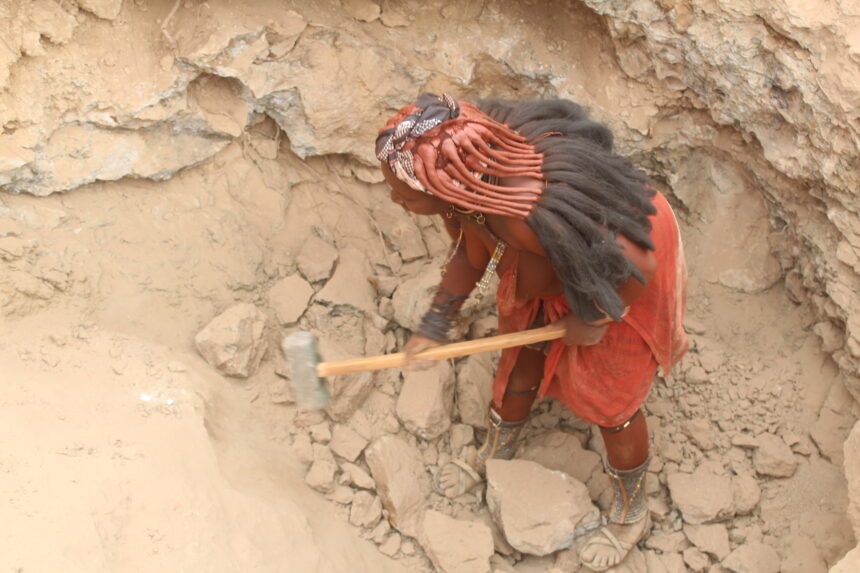Himba mother Jakarisiua Tjiurua said she does not sit idle at home while her children languish in poverty.
She has decided to take on the gruelling task of copper stone mining at Ohungumure village near Opuwo. Traditionally seen as men’s work due to its physical demands, mining has become a lifeline for Tjiurua and her eight children, who depend on her for survival. In this small village, mining for copper has become a means of survival for many locals, most of whom are men.
But undeterred by the hard labour, she has joined their ranks, bringing some of her children along to help.
They dig for copper stones, fill up 50-kilogramme bags, and sell them to Chinese buyers. When New Era arrived at the mining site en route to Etanga village, our crew found her hard at work. She was deep inside a hole, hammering away at rocks in search of copper. Her determination was palpable, as she relentlessly chipped away at the stones.
Once she had enough, she began picking the pieces and filling a bag with the help of her daughter, who sat nearby.
What pushed her into mining was poverty.
“I used to rely on my livestock. But the drought has devastated our area over the past few years, and I lost everything – goats, cattle… all gone. I had nothing left to feed my family with. We do get drought relief food, but it’s not enough. I have too many mouths to feed,” she narrated.
Her eldest child is 16, while the youngest is 11.
“My children still need me,” she added.
“I’ve seen other children suffer from malnutrition, and I told myself that mine will not suffer as long as I have strength left in me,” she stated.
Locals like Tjiurua began mining last year, selling the copper they collect in buckets or bags.
A 20-litre bucket and a 20kg bag fetches N$200, while 50kg sells for N$450.
Their primary buyers are Chinese nationals, who come to the site weekly to purchase the raw materials.
“This work may be tough, but it’s better than doing nothing,” said Ueripuravi Tjondu, another resident who mines alongside Tjiurua.
“We survive by selling whatever we can collect each day,” he said.
He observed that while they are determined to fight poverty, they lack the proper equipment to make the work more
efficient.
“Everything is done by hand. If we had better tools, we could get more copper, and do it so much faster.
We’re trying our best after losing our livestock to drought, but we need some help with machinery,” the miner continued.
He also appealed to good Samaritans to donate mining equipment so that more community members could get involved and support their families.
The site had been mined
long before Namibia’s independence when Canadians came to extract copper.
After the drought hit last year, the community decided to explore the area, and they rediscovered the copper deposits.
“We took the stones to town in Opuwo, looking for buyers. That’s how the Chinese nationals found us, and started buying from us. But we need more buyers so we can get fairer prices. Right now, we just sell for whatever we can get because we only have one main customer,” he said.



